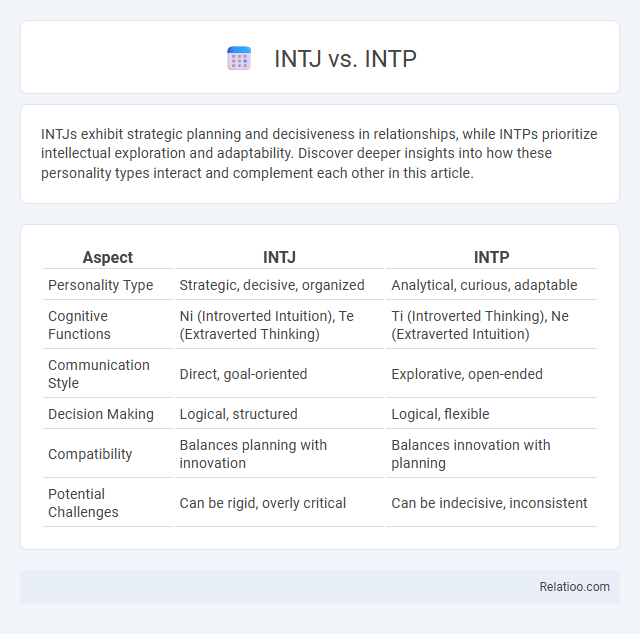INTJs exhibit strategic planning and decisiveness in relationships, while INTPs prioritize intellectual exploration and adaptability. Discover deeper insights into how these personality types interact and complement each other in this article.
Table of Comparison
| Aspect | INTJ | INTP |
|---|---|---|
| Personality Type | Strategic, decisive, organized | Analytical, curious, adaptable |
| Cognitive Functions | Ni (Introverted Intuition), Te (Extraverted Thinking) | Ti (Introverted Thinking), Ne (Extraverted Intuition) |
| Communication Style | Direct, goal-oriented | Explorative, open-ended |
| Decision Making | Logical, structured | Logical, flexible |
| Compatibility | Balances planning with innovation | Balances innovation with planning |
| Potential Challenges | Can be rigid, overly critical | Can be indecisive, inconsistent |
Introduction to INTJ and INTP Personality Types
INTJ and INTP personality types, both part of the Myers-Briggs Type Indicator, share a strong preference for introversion and intuition, leading to a deep focus on abstract concepts and future possibilities. INTJs are characterized by their strategic planning and decisive nature, often excelling in goal-oriented environments, while INTPs thrive on logical analysis and creative problem-solving, valuing flexibility over structure. Their shared interest in intellectual exploration and understanding complex systems creates a foundation for collaboration, though their approaches to decision-making and organization differ significantly.
Key Differences Between INTJ and INTP
INTJ personalities prioritize strategic planning, long-term vision, and structured decision-making, while INTP individuals emphasize abstract thinking, spontaneity, and exploration of ideas. Both INTJ and INTP share interests in intellectual pursuits, problem-solving, and theoretical concepts, yet INTJs approach tasks with organization and decisiveness, whereas INTPs prefer open-ended analysis and adaptability. Key differences between INTJ and INTP lie in their cognitive functions: INTJs rely on Introverted Intuition (Ni) and Extraverted Thinking (Te), focusing on closure and efficiency, whereas INTPs use Introverted Thinking (Ti) and Extraverted Intuition (Ne), favoring internal consistency and creative exploration.
Cognitive Functions: A Comparative Overview
INTJ and INTP personalities share dominant introverted intuition (Ni) and introverted thinking (Ti), respectively, shaping their analytical and strategic thinking patterns. Both types exhibit strong preferences for intuition and thinking, fostering a natural interest in abstract concepts and innovative problem-solving. Understanding your cognitive functions in the INTJ and INTP frameworks enhances self-awareness and improves collaboration by recognizing how each processes information and approaches decision-making.
Decision-Making Styles: Logic vs. Strategy
INTJ and INTP personalities both prioritize logic in decision-making but diverge in approach; INTJs employ strategic planning to achieve long-term goals, while INTPs favor exploratory analysis and adaptability. Shared interest in rational problem-solving allows both types to excel in complex scenarios, yet INTJs focus on structured execution, whereas INTPs emphasize innovative thinking and flexibility. This contrast in decision-making styles reflects INTJs' preference for definitive solutions and INTPs' affinity for theoretical possibilities.
Approach to Problem-Solving
INTJ individuals employ a structured, strategic approach to problem-solving, relying on long-term planning and decisive action, while INTPs prefer an exploratory, flexible method, analyzing various possibilities before drawing conclusions. Both types share a strong interest in abstract concepts and logical reasoning, which drives their mutual enthusiasm for intellectually challenging problems. Your ability to blend the INTJ's goal-oriented mindset with the INTP's inventive curiosity can lead to highly effective and innovative solutions.
Communication Styles and Social Interaction
INTJ individuals communicate with strategic clarity and prefer structured, goal-oriented discussions, while INTPs favor exploratory conversations filled with abstract ideas and open-ended questions. Both types value intellectual depth but differ in social interaction; INTJs often seek efficient, purpose-driven engagement, whereas INTPs enjoy playful, thought-provoking dialogue that allows for flexibility. Understanding these communication styles helps you navigate conversations effectively, balancing INTJ's decisiveness with INTP's curiosity.
Strengths and Weaknesses of INTJ and INTP
INTJ strengths lie in strategic planning, decisiveness, and long-term vision, while their weaknesses may include rigidity and difficulty adapting to spontaneity. INTP strengths focus on analytical thinking, creativity, and problem-solving, with weaknesses often involving procrastination and social detachment. Your understanding of these cognitive preferences enhances collaboration by leveraging INTJ's structured approach and INTP's innovative ideas.
Career Preferences and Work Environments
INTJs prefer structured, strategic roles that emphasize long-term planning and leadership, thriving in goal-driven, organized work environments. INTPs excel in flexible, innovative settings that allow for independent problem-solving and creative thinking, often favoring research, analysis, or technical careers. Both types share a strong interest in intellectual challenges and value autonomy, making careers in technology, science, or entrepreneurship suitable for their complementary cognitive strengths.
Relationships and Compatibility
INTJ and INTP personalities both value intellectual stimulation and deep, meaningful conversations, fostering strong mutual understanding in relationships. INTJs prefer structured plans and long-term goals, while INTPs thrive on flexibility and exploration, creating a balance of stability and spontaneity in compatible partnerships. Shared interests in knowledge and innovation enhance communication, but successful compatibility relies on respecting each other's approaches to problem-solving and emotional expression.
Conclusion: INTJ vs INTP – Which Are You?
INTJ personalities prioritize strategic planning and long-term goals, exhibiting decisive and structured thinking, while INTPs emphasize theoretical exploration and adaptability with a preference for open-ended problem-solving. Both INTJ and INTP types share a strong commitment to intellectual pursuits and value independent thinking, often thriving in environments that encourage innovation and deep analysis. Identifying whether you lean towards INTJ's goal-driven mindset or INTP's curiosity-driven approach helps tailor your personal development and career path for maximum fulfillment and effectiveness.

Infographic: INTJ vs INTP
 relatioo.com
relatioo.com